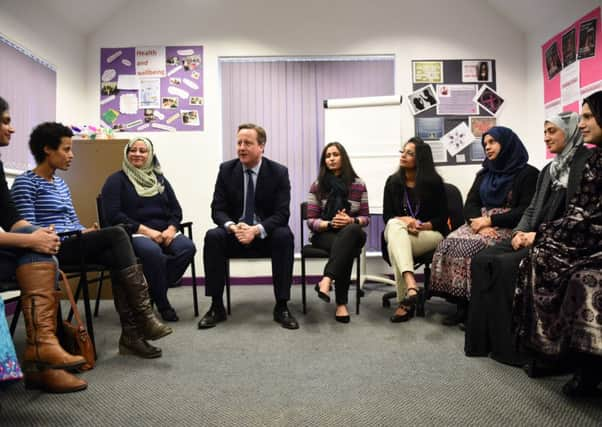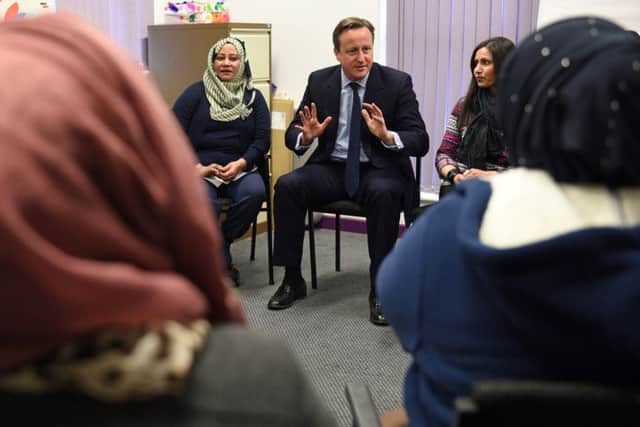Aisha Iqbal: English lessons to fight extremism? Time to mind YOUR language, Mr Cameron


Of course that’s not exactly what the Government’s latest scheme to invest £20m into English classes targeted at ethnic minority women - launched in Leeds by the Prime Minister on Monday - is suggesting, but it doesn’t take a massive ideological leap to get there.
Particularly galling to many objectors - and the backlash has been predictable in its intensity - is the hinted-at ‘learn or leave’ clause which suggests that a foreign spouse who fails to learn a certain level of English after a specified time limit may face deportation. This test would, it is assumed, be additional to the existing English language requirements and Life in the UK test for non-EU nationals who come to the UK to join their British partners. I can’t help but foresee a U-turn on this one somewhere down the line, but the headlines are already written and the damage is already done.
Then there’s the tiny matter of radicalisation.


Advertisement
Hide AdAdvertisement
Hide AdVisiting Leeds this week, David Cameron warned that not speaking English adequately could make people “more susceptible” to the recruitment messages of groups like Daesh (Islamic State).
Seriously? Suggesting that the fight against extremism could be remotely linked to a lack of English skills is simplistic and, frankly, ridiculous.
It is quite irresponsible too, because it unfairly and disproportionately shifts another burden of responsibility onto Muslim communities who are already under the microscope from all sides.
And the conflation also dilutes two very important but very distinctly different issues affecting large portions of our society, both of which have been chronically mis-handled by successive Governments.


Advertisement
Hide AdAdvertisement
Hide AdIt might have escaped some people’s notice, but Daesh doesn’t speak Somali or Afghan or Punjabi or Kurdish. It speaks internet and social media, and it speaks very good English on the whole.
Some of the families who are thought to have travelled to Syria to join Daesh contained two, even three, generations for whom English is their first language. A few of them were white British. Before that, the mums and family members of some of the London bombers spoke with the broadest of Yorkshire accents.
So how did their language skills - or lack thereof - protect them and their loved ones from (or push them towards) being brainwashed? The mind boggles.
There ARE pockets of the country where large portions of people don’t speak a high amount of English. It would be disingenuous to deny that.
Advertisement
Hide AdAdvertisement
Hide AdBut these tend to be inner city communities, usually where there is massive underinvestment and unemployment already.
To add to the mix, new arrivals from foreign shores - of various nationalities and religious affiliations - are often dumped in run-down areas where there is already a chronic lack of resources.
Some people have to rely on ‘back home’ networks to survive. Yes, there is an element of genuine isolation but it is not, in my considerable personal experience, the only factor. These problems are a perennial part of the wider immigration game. We cannot create virtual ghettos, Mr Cameron, and then try to eradicate them with one contradictory, swooping soundbite.
Language is a massive factor in helping people to integrate with their new surroundings. But to single out Muslim women, as the Government is clearly doing with its latest scheme, could be hugely counterproductive.
Advertisement
Hide AdAdvertisement
Hide AdThere is also deep hypocrisy and hyperbole in the political language chosen to promote the latest initiative.
As is often the case, it’s not what you say, but how and when you choose to say it.
I remember reporting way back in 2007 that the Milun Centre in Harehills, Leeds - a lifeline community centre offering Asian women English lessons and training opportunities - was threatened with closure due to cuts in voluntary sector funding. The centre - whose name means ‘togetherness’ - barely survived with only a skeleton service, and language classes didn’t escape the axe.
Just last year, the current Government scrapped free ESOL classes to save £45m. Now they want to effectively bring them back, packaging them as new.
Advertisement
Hide AdAdvertisement
Hide AdTime and again, politicians from successive Governments wheel out the rhetoric when it suits them, but very rarely do they put real money where their headline-grabbing mouth is. And time and again, one particular community is dragged screaming into the spotlight, whether by political design or media mischief.
Mr Cameron visited Leeds on Monday to speak to some of the very people this ‘new’ programme is targeted at, among them professional Muslim women who have grown up in the UK, and more recent arrivals. Meeting ladies at the Makkah Mosque in Hyde Park and the Shantona women’s centre in Harehills, he listened to calls to empower women, and the need to establish and promote a new, positive image of British Islam to counteract the negativity. But as one of the invited ladies pointed out to him, the English language scheme was not the way to tackle extremism. It was also “too little too late” for many women, and “it would have been far more helpful to be engaged in the shaping of this process” rather than being canvassed for views after the fact.
It was also pointed out to the PM that the focus should be put on training, education and - crucially - long term, grass-roots funding for support organisations.
According to recent figures from the Migration Observatory, 12.5 per cent of the current UK population were born abroad. But ‘abroad’ covers a whole lot more than people from Muslim or Asian backgrounds. In the last census, there were 2.7m UK residents who identified as Muslim. In the first quarter of 2015, there were just over 3 million people born in the EU living in the UK. There is no requirement for the latter to fulfil any language requirement.
Advertisement
Hide AdAdvertisement
Hide AdIt is claimed that the new English language classes and tests are aimed at helping women like the 38,000 Muslim ladies who said in the last census that they don’t speak English at all, and the 190,000 who said they speak it badly. In the 2011 census, 846,000 UK women identified as Muslim, meaning the 38,000 who said they spoke no English represent just 4.5 per cent of the total. So more than 95 per cent of British Muslim women DO speak English. It would be interesting to see how many of those 38,000 have recently emigrated to the UK and may therefore not have had a chance to seek learning opportunities at the time of asking.
I am no apologist for the misogynistic minority of men from some communities who do hold their women back from learning and improving, who would deny them English skills and driving lessons, but some of Mr Cameron’s comments also do a great injustice to the majority of Muslim men who embody the opposite of that caricature.
Mr Cameron should stop painting himself as the liberator of the UK’s oppressed female Muslim masses, because at LEAST 95 per cent of them are not.
When all is said and done, true integration cannot be forced. It is an organic process.
Advertisement
Hide AdAdvertisement
Hide AdJust a few days ago, I visited an Asian-run grocery store in Harehills. The man behind the counter was of South Asian origin and spoke excellent English, though clearly he was not a native speaker. The female customer, who had an Eastern European accent but barely a few words of English, was struggling to make herself understood. But between them, and with the help of another customer, they managed it. I couldn’t help but smile at the circularity of it all, remembering my own mum’s initial language struggles, which she overcame well. And yes, she DID attend English classes in the 1970s and 1980s when they were the common-sense norm for new arrivals, and not a political football.
I’m all for everyone in England speaking English. To suggest otherwise, as far I am concerned, is an affront to common sense.
But in a bid to encourage us all to communicate better with each other, our politicians often mis-communicate so much - and fall back on populist rhetoric which ends up alienating the very groups they want to help.
Maybe it’s time THEY started minding their language?